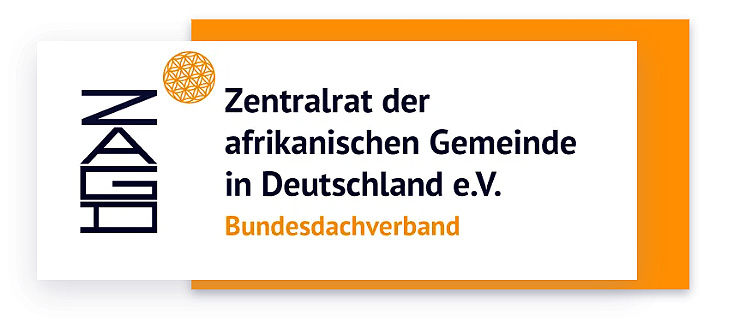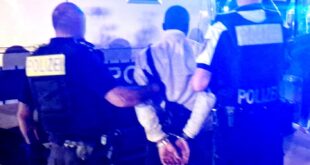As Nigeria celebrates the 60th anniversary of its independence from British colonial rule, a group representing the Yoruba people of Africa’s most populous country rallied in major cities across the world on Thursday to express their desire for national self-determination. Nigeria gained freedom from British rule on 1 October 1960.
About 60 people participated at a demonstration in Berlin, part of the global protest action organised by the coalition group Yoruba One Voice Worldwide, to call for an independent nation state for the Yoruba-speaking people of southwest Nigeria, the Oduduwa Republic.
Yoruba constitute about 21% of Nigeria’s estimated population of 200 million people, making them one of the largest ethnic groups in Africa. The Yoruba One Voice Worldwide says it “represents a broad spectrum of Yoruba people comprising of opinion and community leaders, intelligentsia, professionals, business owners, the working class and students of tertiary institutions residing both in Nigeria and Diaspora”.
The protesters in Berlin carried out a 3-hour procession through the German capital city — starting at the underground station Heinrich-Heine-Strasse, making a brief stop-over in front of the Nigerian embassy before ending on the grounds of the federal parliament, the Reichstag.
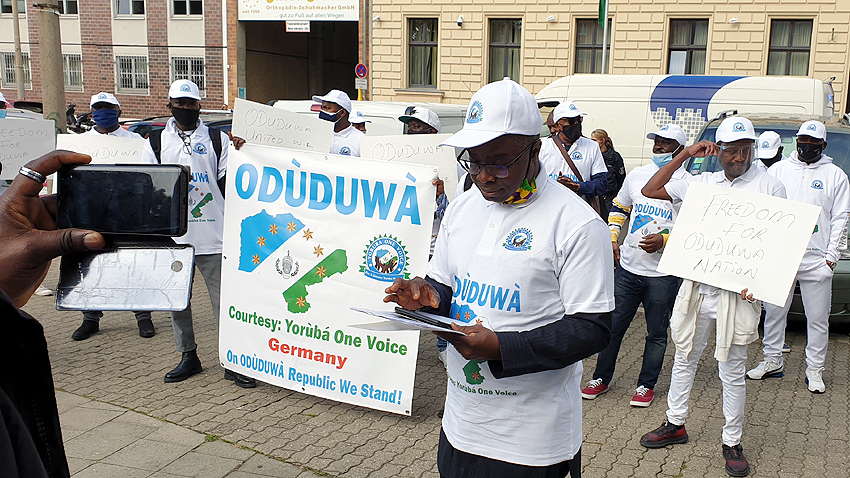
Addressing the protesters, Akinola Famson, president of the Egbe Isokan Omo Yoruba Germany (EIOYG), an umbrella body of all Yoruba associations in the Federal Republic of Germany, said the time had come for Nigeria to hold a national referendum to enable its constituent nationalities determine whether they wanted to continue to be part of the country.
Mr Famson said the situation of Nigeria today, 60 years after independence, proved that it was not working as a united nation. It was time, therefore, for the Yoruba to seek better life for their people outside of the “colonial contraption called Nigeria”.
Famson appealed to the demonstrators to carry out their protest peacefully, relaying the advice of Prof Banji Akintoye, the president of the World Yoruba Congress, to participants of the event across the globe.
Famson read the message of Akintoye to all Yoruba groups taking part in the protest action in which he said Yorubaland was under the siege of heavily armed Fulani militia, who had made life difficult for other Nigerians through activities such as kidnapping on highways, destruction of farmlands by their herds of cattle and unprovoked attacks on rural communities leading to loss of lives and destruction of property.
Enough of amalgamation
“Enough of amalgamation,” the coordinator of the Oduduwa People’s Union Germany, Mikhail Idris, said in his brief speech, referring to the British merger of Northern Nigeria Protectorate and the Colony and Protectorate of Southern Nigeria, thereby creating the single colony of Nigeria, in 1914.
Mr Idris opined that Nigeria had not worked for 60 years and, given the situation of the country today, indications were that things would get worse. This, therefore, made it imperative for Yoruba people to seek self-determination so that “they would be free to pursue their national destiny”.
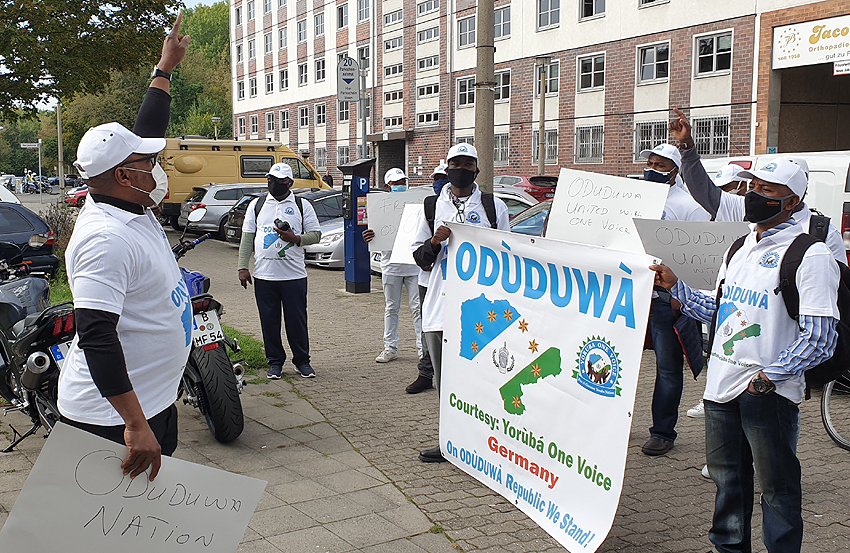
Continuing, Idris said his group would not be discouraged by the modest number of participants at the demonstration as “the journey of a thousand miles begins with a single step”, expressing confidence that the struggle for a Yoruba national state would eventually succeed “no matter how long it takes”.
A participant at the event in Berlin, who wanted to be referred to by his first name Hakeem, said the situation in Nigeria called for the urgent attention of the international community.
“The country is on a roller coaster. Mass unemployment, especially among the youth, mass poverty and endemic insecurity are making life unbearable for the people,” he lamented. “The international community must intervene before it’s too late.”
Yoruba under the yoke of occupiers
Another participant, Lere Agbo, said Yoruba were like “a people under the yoke of an occupation force”, referring to the Fulani herdsmen, whose attacks on unprotected villages have become more devastating since the election of President Muhammadu Buhari in 2015. Victims allege that the real intention of the attacks are to displace the ancestral inhabitants to take over their land.
“Due to unemployment, people should normally take to agriculture which would even bolster the country’s economy. Yet people cannot go to their villages to farm as Fulani terrorists have turned ordinary farming to a life-threatening occupation,” Agbo said.
“And those in the business of trading cannot also travel freely from one town to the other to buy and sell because of Fulani kidnappers on the highways,” he added.
“Where do we go from here?”
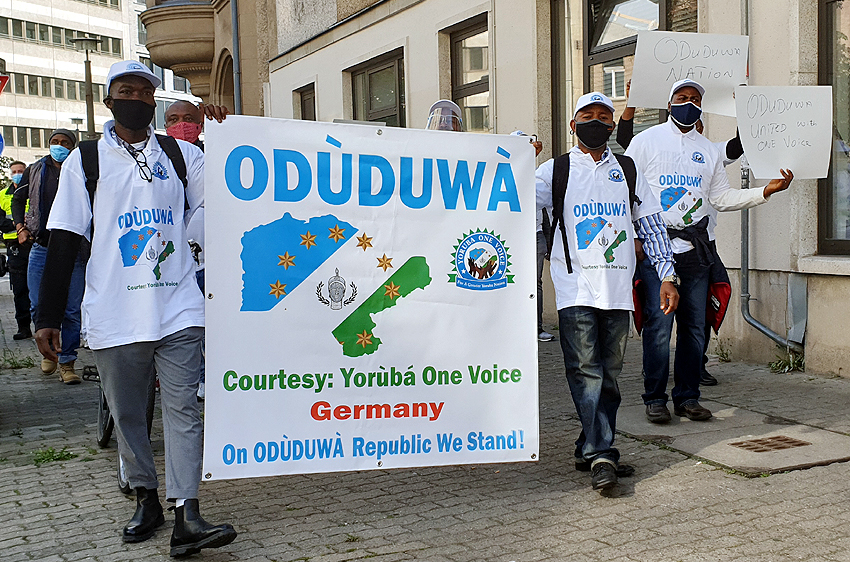
Agbo also called on Germany to use its current EU Presidency to draw attention of the bloc to the “impossible situation” in Nigeria to “avert disaster whose fallout Europe cannot escape from”.
Similar public demonstrations calling for an independent Oduduwa Republic, under the auspices of the Yoruba One Voice Worldwide, took place across the globe, including in Paris, Luxembourg, London, Johannesburg and across southwest Nigeria.
Little to celebrate at 60
Nigeria has truly little to celebrate on the 60th anniversary of its independence as the country is right now in a very difficult situation. Activities of Boko Haram terrorists and Fulani herdsmen have made most parts of the country insecure, making peaceful economic activities and development impossible and further increasing the hardship of the people.
Nigeria is considered already by the World Bank to have the highest number of people living in extreme poverty in the world.
“Killings of innocent people have become a daily reality in Nigeria, particularly for ethnic and religious minorities,” Abdallah Baikie of the Lagos-based International Organisation for Peacebuilding and Social Justice, wrote recently in an open letter to the EU.
More than 43,000 Nigerians are estimated to have been killed by Boko Haram terrorists and another 19,000 by Fulani extremists in the past 20 years. There are currently more than 2.8 million internally displaced persons (IDPs) in Nigeria, according to the UNHCR last update in July 2020.
“The scale of this major societal conflict, occurring amid global indifference, is worryingly reminiscent of the Rwandan genocide, setting a potentially comparable scenario on the horizon,” Baikie said.
Nigeria is rated by the global terrorism index 2019 as the third most affected country by terrorism in the world, behind Afghanistan and Iraq and ahead of Syria and Pakistan.
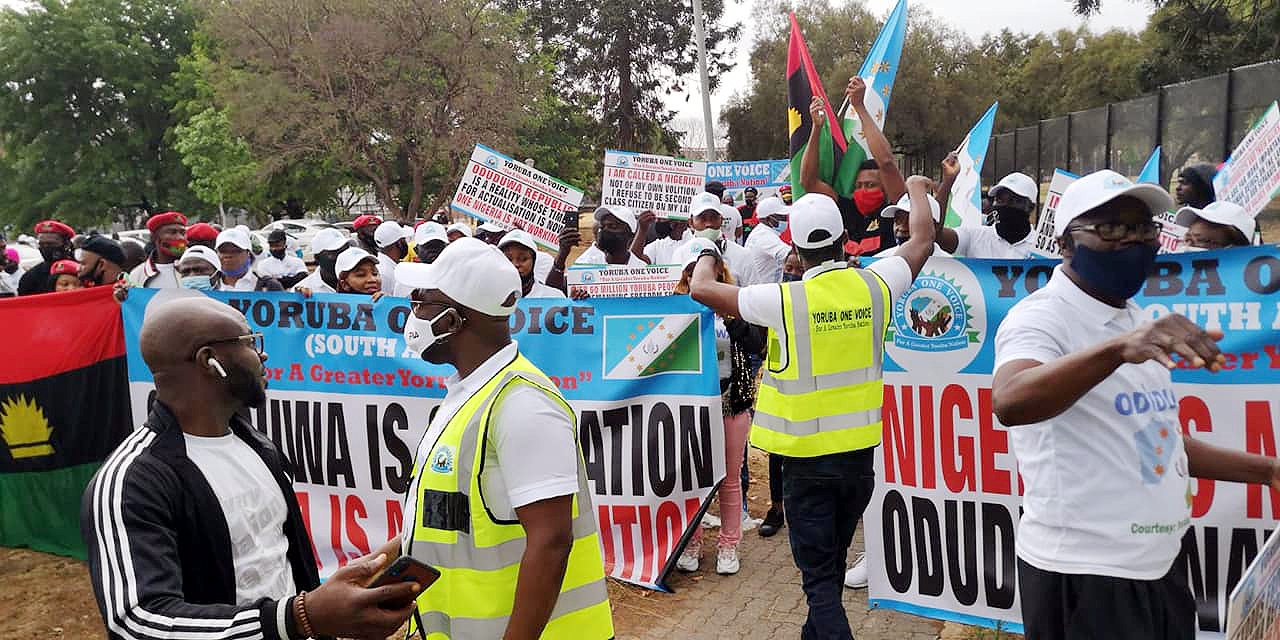
The Yoruba protest action and similar agitations by the Indigenous People of Biafra (IPOB), an organisation advocating for an independent Republic of Biafra for the Igbo people of Nigeria, are a sad commentary on the political management of the country’s diversity, analysts say.
President Buhari, a Muslim Fulani from northern Nigeria, has been particularly accused of favouring those he considered his kith and kin at the expense of other Nigerians.
Critics allege that other Nigerian groups are marginalised in key government appointments, especially in the security forces, which has rendered them incapable or unwilling to address the security challenges facing the country. Some critics, including former minister of defence, retired General Yakubu Danjuma, have even alleged official complicity in the activities of the Fulani herdsmen.
“President Muhammadu Buhari’s persistent silence [about the activities of Fulani herdsmen] is further encouragement to Fulani extremists to pillage and occupy land and to kill anyone who resists,” Abdallah Baikie wrote.
“The government’s response to most incidents reinforces the Fulani as a group of attackers that need not fear criminal repercussions.”
Pains of diversity
Nigeria is home to over 250 ethnic groups, making it a country of great cultural diversity.
The largest ethnic groups are the Hausa 25% of the population along with the Yoruba 21%, Igbo 18%, Ijaw 10%, Kanuri 4% and Fulani 4%.
READ ALSO Dressman calls for greater unity among Nigerians in diaspora
Muslim Hausa and Fulani, who together make up approximately 29% of the population of Nigeria, are the predominant ethnic groups in the country’s northern region.
Through religion, intermarriage and adoption of the Hausa language by the Fulani, the two groups have socially, culturally and politically unified over time and are referred to collectively as Hausa-Fulani and they have been politically dominant since Nigeria’s independence from Britain in 1960.
The Biafra War, 1967-1970, was fought over the attempt of the Igbo of eastern Nigeria to secede from the federation after the genocidal killing of their people in northern Nigeria following the country’s first military coup of January 1966.

Despite the policy of ‘no victor, no vanquished’ proclaimed by the then military government after the war, the agitation for Biafra is still strong, 40 years after the war, and has been successfully internationalised by IPOB due to the marginalisation of the Igbo in national politics.
“Never in the history of post-civil war Nigeria has the agitation for Oduduwa Republic and Biafra been as strong as it is today. Never have our independence celebrations been drowned by the cry for the dismemberment and balkanisation of Nigeria in this way,” Femi Fani-Kayode, a former minister and loud critic of the Buhari administration, commenting on the separatist agitations said.
“We ignore, dismiss and ridicule these agitations at our own peril.”
Observers say the separatist agitations have the potential to tear Nigeria apart, a frightening prospect due to the size of the country and its importance in regional geopolitical stability. This is why analysts are calling for the attention of the world to the brewing trouble in Africa’s most populous country.
Femi Awoniyi
READ ALSO Why EU should help to end the Nigeria slaughter – Human rights activist
 THE AFRICAN COURIER. Reporting Africa and its Diaspora! The African Courier is an international magazine published in Germany to report on Africa and the Diaspora African experience. The first issue of the bimonthly magazine appeared on the newsstands on 15 February 1998. The African Courier is a communication forum for European-African political, economic and cultural exchanges, and a voice for Africa in Europe.
THE AFRICAN COURIER. Reporting Africa and its Diaspora! The African Courier is an international magazine published in Germany to report on Africa and the Diaspora African experience. The first issue of the bimonthly magazine appeared on the newsstands on 15 February 1998. The African Courier is a communication forum for European-African political, economic and cultural exchanges, and a voice for Africa in Europe.


